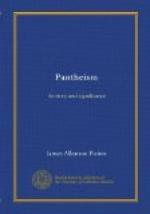obviously not Pantheism. Whether we should recognise
as true Pantheism any theory involving the evolution
of a finite world or worlds out of the divine substance
at some definite epoch or epochs, may be a debatable
question, provided that the eternity and inviolability
of the divine oneness is absolutely guarded in thought.
Yet I will anticipate so far as to say that, in my
view, the question must be negatived. At any
rate, we must exclude all creeds which tolerate the
idea of a creation in the popular sense of the word,
or of a final catastrophe. True, the individual
objects, great or small, from a galaxy to a moth,
which have to us apparently a separate existence,
have all been evolved out of preceding modes of being,
by a process which seems to us to involve a beginning,
and to ensure an end. But in the view of Pantheism,
properly so-called, the transference of such a process
to the whole Universe is the result of an illusion
suggested by false analogy. For the processes
called evolution, though everywhere operative, affect,
each of them, only parts of the infinite whole of
things; and experience cannot possibly afford any justification
for supposing that they affect the Universe itself.
Thus, the matter or energy of which we think we consist,
was in existence, every atom of it, and every element
of force, before we were born, and will survive our
apparent death. And the same thing, at least on
the Pantheistic view, is true of every other mode
of apparently separate or finite existence. Therefore
no birth of a new nebula ever added a grain of matter
or an impulse of new energy to the Universe.
And the final decease of our solar system, if such
an event be in prospect, cannot make any difference
whatever to the infinite balance of forces, of which,
speaking in anthropomorphic and inadequate language,
we suppose the Eternal All to consist.
[Sidenote: Limitation of Scope.]
These observations are not intended to be controversial,
but only to make clear the general sense in which
the term Pantheism is here used. Not that it
would be possible at the outset to indicate all that
is implicit in the definition. I only wish to
premise plainly that I am not concerned with any view
of the world such as implies or admits that, whether
by process of creation, or emanation, or self-division,
or evolution, the oneness of the Eternal has ever
been marred, or anything other than the being of God
has been or can be produced.
[Sidenote: Pantheism either Philosophical or
Religious or both.]
[Sidenote: Pantheism as a Religion almost Entirely
Modern.]
[Sidenote: Mystics not necessarily Pantheist.]




